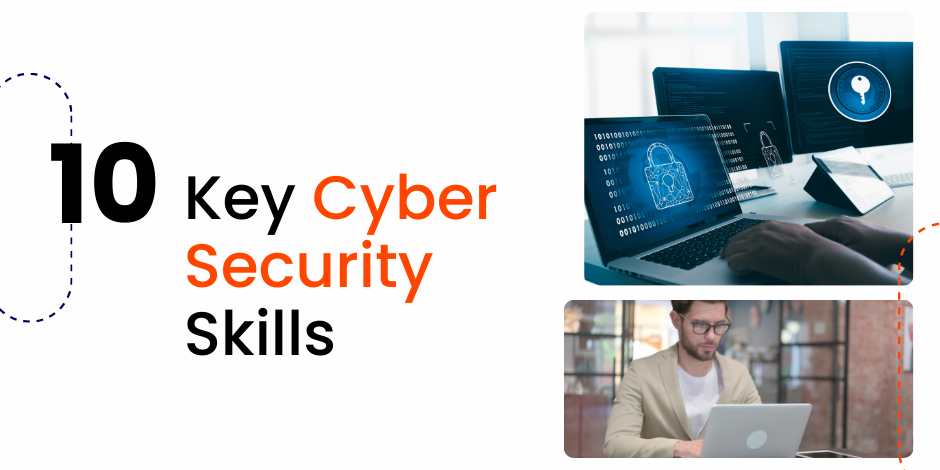10 Key Cyber Security Skills

Stay Informed With Our Weekly Newsletter
Receive crucial updates on the ever-evolving landscape of technology and innovation.
Cyber security has become essential to protecting sensitive information and ensuring the integrity of systems and networks.
Cyber threats are constantly changing, making it even more crucial for individuals and businesses to possess cyber security skills.
By understanding the importance of these skills, you can enhance your capabilities and effectively protect your digital assets.
Understanding the importance of cyber security skills

With the increasing number of cyberattacks and data breaches, organisations recognise the significance of robust cyber security measures.
Cyber security skills are essential for businesses of all sizes to safeguard their networks, systems, and data from potential threats.
In addition to protecting networks and data, cyber security skills also play a crucial role in maintaining customer trust.
In an era where online transactions and personal information sharing have become the norm, customers expect businesses to prioritise the security of their sensitive data.
By investing in cyber security skills, organisations can demonstrate their commitment to protecting customer information and maintaining a secure digital environment.
The role of cyber security in today’s digital world
In the modern era, where everything is connected through the internet, cyber security is vital in protecting critical infrastructure, financial transactions, personal data, and national security.
Without proper cyber security measures, individuals and businesses can become vulnerable to cybercriminals and malicious activities with severe consequences.
One area where cyber security skills are particularly crucial is protecting critical infrastructure.
Power grids, transportation systems, and communication networks are all examples of critical infrastructure that rely heavily on technology.
A successful cyberattack on these systems could have devastating consequences, leading to power outages, transportation disruptions, and compromised communication networks.
By having skilled cyber security professionals in place, organisations can proactively identify vulnerabilities and implement measures to prevent such attacks.
Why are cyber security skills crucial for businesses?
Regardless of their size or industry, organisations are increasingly relying on technology.
Businesses are exposed to various cyber security risks, from online transactions to cloud storage.
Cyber security skills enable organisations to identify, prevent, and respond effectively to potential threats and mitigate risks, ultimately ensuring continuity and security.
Cyber security skills are not only crucial for preventing external threats but also for addressing internal vulnerabilities. Insider threats, such as employees with malicious intent or unintentional mistakes, can pose significant business risks.
Skilled cyber security professionals can implement measures to detect and prevent insider threats, ensuring that sensitive data remains secure.
Identifying the 10 key cyber security skills

1. The art of identifying security threats
Understanding how to identify security threats is fundamental to effective cyber security.
Cyber security professionals must be able to analyse and evaluate the potential risks and vulnerabilities within a system or network. This skill enables them to anticipate and prevent potential cyberattacks.
2. The importance of risk assessment
Risk assessment is a critical skill that helps cyber security professionals identify and prioritise potential threats. It involves analysing vulnerabilities, assessing potential impacts, and implementing measures to mitigate risks.
A strong foundation in risk assessment is crucial for developing effective cyber security strategies.
3. The role of encryption in cyber security
Encryption is a process of encoding information to protect its confidentiality and integrity. It is an essential skill that enables professionals to safeguard sensitive data from unauthorised access.
Understanding different encryption techniques and implementing them is vital for maintaining data security.
4. The value of secure software development
The development of secure software is essential in ensuring the protection of sensitive data and preventing potential vulnerabilities.
Cyber security professionals must possess the skills to design and develop software applications resistant to common cyber threats.
5. The need for network security
Network security is a crucial aspect of cyber security. It involves implementing various measures to protect the integrity of a network and prevent unauthorised access.
Cyber security professionals need to possess strong network security skills to secure networks and identify and respond to potential threats.
6. The significance of cloud security
As businesses increasingly rely on cloud services, securing the cloud environment has become paramount.
Understanding the complexities of cloud security and possessing the skills to protect cloud-based data and applications are essential to maintaining the confidentiality and availability of resources.
7. The impact of mobile security
Mobile devices have become integral to everyday life, personally and professionally.
Cyber security professionals must understand mobile security challenges and the necessary skills to protect sensitive information and prevent mobile-based attacks.
8. The relevance of disaster recovery planning
Disaster recovery planning is a critical skill that enables cyber security professionals to anticipate and prepare for potential disasters, such as system failures or cyberattacks.
By developing comprehensive recovery plans, professionals can minimise the impact of such events and ensure the continuity of operations.
9. The importance of legal and compliance knowledge
Cyber security professionals need to possess a strong understanding of legal regulations and compliance requirements.
This skill ensures that organisations adhere to relevant laws and regulations governing data protection and privacy, reducing the risk of legal consequences.
10. The necessity of continuous learning in cyber security
Cyber security is an ever-evolving field, with new threats and techniques emerging regularly. Professionals must continually update their skills and knowledge to stay ahead of cybercriminals.
Learning through networking opportunities and through programs like those offered by Institute of Data, is crucial for staying current.
Strategies to improve your cyber security skills

Improving your cyber security skills requires education, practical experience, and continuous development.
The following strategies can enhance your capabilities and become a proficient cyber security professional.
Enhancing your knowledge through cyber security courses
Enrolling in cyber security courses is an effective way to acquire new skills and enhance your existing knowledge.
These courses cover various topics, from fundamentals to advanced techniques, and provide hands-on experience in a simulated environment.
Completing a reputable cyber security program can boost your credibility and equip you with the necessary skills to tackle real-world cyber security challenges.
The role of certifications in skill improvement
Obtaining industry-recognised certifications is a testament to your expertise and dedication to cyber security.
Certifications validate your skills and knowledge, enabling you to stand out.
The value of practical experience
Hands-on experience is invaluable in developing cyber security skills.
By participating in practical projects and real-world scenarios, you can apply your theoretical knowledge and gain a deeper understanding of cyber security concepts.
Seek opportunities to work on cyber security projects or consider volunteering for cyber security-related initiatives to gain practical experience.
The importance of staying updated with cyber security trends
As the cyber security landscape evolves, staying updated with the latest trends, threats, and technologies is crucial.
Subscribe to cyber security blogs, forums, and newsletters to stay informed about industry developments.
Engaging in professional discussions and attending industry conferences can also provide valuable insights into emerging trends.
The impact of networking with cyber security professionals
Networking with cyber security professionals allows you to exchange knowledge, learn from their experiences, and discover new opportunities.
Join professional cyber security associations, participate in online communities, and attend networking events to establish connections with like-minded individuals.
Collaborating with other professionals can broaden your understanding of the field and open doors to new career prospects.
Conclusion
By acknowledging the importance of cyber security skills and continuously improving your capabilities, you can play a crucial role in safeguarding digital assets and contributing to a more secure digital world.
Are you ready to dive into the world of cyber security?
The Institute of Data’s Cyber Security program offers an in-depth curriculum to equip you with essential skills to safeguard digital assets and combat evolving cyber threats.
Join us to build a secure digital future by mastering the skills needed in this ever-changing landscape.
Want to learn more about our programs? Contact one of our local teams for a free career consultation today.




